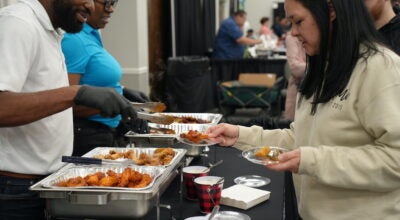Tips for Easter egg safety
Published 5:40 pm Thursday, April 21, 2011
By ANGELA TREADAWAY / Guest Columnist
If you’re planning to decorate Easter eggs this year, or if you’re preparing hard boiled eggs for Passover, here are some egg safety tips to help you and your family avoid an unwanted foodborne illness:
1. Use one set of eggs for decorating and hunting and another for eating. Or to be really safe, use plastic eggs for your Easter egg hunt instead of real ones.
2.Keep everything clean. Wash utensils, countertops and other surfaces that eggs come in contact with. That includes washing your hands thoroughly with soap and hot water before and after handling raw eggs or cooked eggs that will be eaten.
3. Coloring Easter eggs can be fun, but if you’re planning to eat the eggs you dye, make sure that you only use food-grade dyes.
4. Keep hard-boiled eggs intended for eating in the refrigerator until the last possible minute.
5. Under no circumstances should you let anyone eat eggs that have been unrefrigerated (whether at room temperature or outside) for more than two hours. That includes hard-boiled eggs used as part of the Passover seder.
6. If you hollow out eggshells by blowing the raw egg through holes in the shell, you could expose yourself to salmonella from raw egg touching your mouth. To be safe, use pasteurized shell eggs. If pasteurized eggs aren’t available, you should sanitize the outside of the egg before it touches your mouth. To do so, wash the egg in hot water and rinse it in a solution of one teaspoon chlorine bleach per half cup of water.
7.When preparing hard-boiled eggs for an egg hunt, be on the lookout for cracks in the shells. Even tiny cracks can allow bacteria to contaminate the egg. Eggs that have any cracks whatsoever should be discarded.
8. If you’re hiding eggs outside, choose the cleanest hiding places you can, and avoid areas that pets or other animals might visit.
9. Nothing lasts forever! Even hard-boiled eggs that have been refrigerated properly must be eaten within seven days of cooking.
For more information contact Angela Treadaway your Regional Extension Agent from the Alabama Cooperative Extension System at 410-3696.









